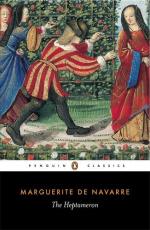To the most Illustrious and Virtuous Princess, Madame Jane de Foix, Queen of Navarre,
Claud Gruget, her very humble servant, presents salutation and wishes of felicity. (1)
I would not have interfered, Madam, to present you with this book of the Tales of the late Queen, your mother, if the first edition had not omitted or concealed her name, and almost entirely changed its form, to such a point that many did not recognise it; on which account, to render it worthy of its author, I, as soon as it was divulged, gathered together from all sides the copies I could collect of it written by hand, verifying them by my copy, and acting in such wise that I arranged the book in the real order in which she had drawn it up. Then, with the permission of the King and your consent, it was sent to the press to be published such as it should be.
Concerning it, I am reminded of what Count Balthazar says of Boccaccio in the Preface to his Courtier(2) that what he had done by way of pastime, namely, his Decameron, had brought him more honour than all his other works in Latin or Tuscan, which he esteemed the most serious.
1 This preface was
inserted in the edition issued in 1559
by Claud Gruget, who
gave the title of “Heptameron” to
Queen Margaret’s
tales.
2 The Libro del Cortegiano, by Count Baldassare Castiglione, was the nobleman’s vade-mecum of the period. First published at Venice in 1528, it was translated into French in 1537 by J. Colin, secretary to Francis I.—Ed.
Thus, the Queen, that true ornament of our century, from whom you do not derogate in the love and knowledge of good letters, while amusing herself with the acts of human life, has left such beauteous instructions that there is no one who does not find matter of erudition in them; and, indeed, according to all good judgment, she has surpassed Boccaccio in the beautiful Discourses which she composes upon each of her tales. For which she deserves praise, not only over the most excellent ladies, but also among the most learned men; for of the three styles of oration described by Cicero, she has chosen the simple one, similar to that of Terence in Latin, which to every one seems very easy to imitate, though it is anything but that to him who tries it.
It is true that such a present will not be new to you, and that you will only recognise in it the maternal inheritance. However, I feel assured that you will receive it favourably, at seeing it, in this second impression, restored to its original state, for according to what I have heard the first displeased you. Not that he who put his hand to it was not a learned man, or did not take trouble; indeed it is easy to believe that he was not minded to disguise it thus, without some reason; nevertheless his work has proved unpleasing.
I present it to you then, Madam, not that I pretend to any share in it, but only as having unmasked it to restore it to you in its natural state. It is for Your Royal Greatness to favour it since it proceeds from your illustrious House, whereof it bears the mark upon the front, which will serve it as a safe-conduct throughout the world and render it welcome among good company.




